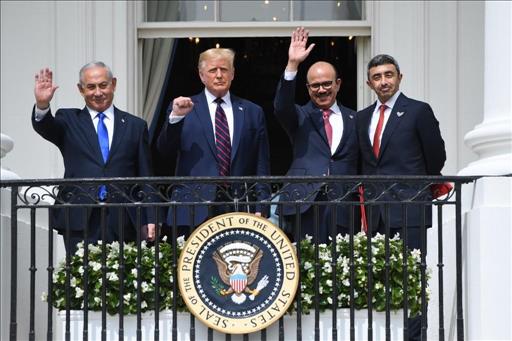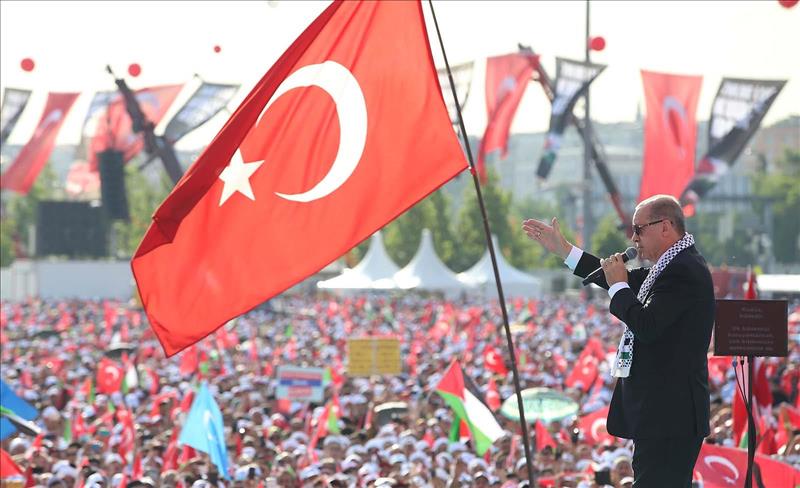(MENAFN- Asia Times) While Turkey had already been straining to build better relations with Israel, the recent violence in Gaza, Jerusalem and elsewhere has blown asunder hopes of any real rapprochement.
Just a few months after Turkish President Recep Tayyip Erdogan said he would like to bring Turkish-Israeli relations ''to a better point'', Wednesday night saw him call on the international community to ''give Israel a strong and deterrent lesson,'' according to the official Turkish read-out of a phone call he had made to Russian President Vladimir Putin.
Erdogan has also called for the international and Muslim worlds to consider deploying an international force to Gaza to protect the Palestinians.
''I think this could be the shortest ''normalization'' in history,'' Soner Cagptay, director of the Turkey Research Program at the Washington Institute for Near East Policy, told Asia Times.
Yet, as the much more restrained read-out of the same phone call from the official Russian news agency TASS suggests, Erdogan's calls for more determined action may be more rhetoric than substance.
''Vladimir Putin and Recep Tayyip Erdogan called on the sides to de-escalate tensions and called for peaceful regulation of arising disputes,'' TASS reported on May 12 – largely echoing more measured international responses from Washington, Brussels and Beijing.
At the same time, ''While the Turkish presidential palace is trying to coordinate some pan-Islamic diplomatic response,'' Dr Clemens Hoffman, international politics expert from the University of Stirling, told Asia Times, ''the taste for really confronting Israel is likely moderate to nil from Jakarta to Rabat.''

A man with Palestine flag participates in a pro-Palestinian protest against the recently renewed armed conflict between Israel and Palestine. Photo: Nicolas Economou/NurPhoto via AFP
Indeed, last year saw several traditionally anti-Israeli governments – the UAE, Bahrain, Sudan and Morocco – ''normalize'' their relations with Tel Aviv via a series of agreements brokered by the US.
Known as the Abraham Accords, these new relationships are now under a great deal of pressure. Yet, abandoning them entirely may be a step too far for regimes that have scored considerable benefits from cozying up to the Israelis.
Reaching Out
The UAE was the first to announce ''normalization'' with Israel, back in September 2020. Bahrain and Sudan then followed, with Morocco signing its Accord in December.
Diplomatic relations were established between these states and Israel, a nation that all of them had long officially seen as a number one enemy.
As the Accords were brokered by the US, they had also been touted as a major achievement by the US administration of then-president Donald Trump.
In that conciliatory spirit, Turkey also announced in December 2020 that it would also like to improve its relations with Israel.
Earlier, Turkey-Israel relations suffered a major breakdown under Erdogan. He had accused Israel of ''genocide'' against the Palestinians, recalled Turkey's ambassador and opened offices in Turkey for Palestinian group Hamas – seen by Israel and the US as a ''terrorist'' organization.
Yet, in late December 2020, following cooperation with the Israeli military in the Nagorno-Karabakh conflict, Erdogan announced that he wished to see relations improve.
Turkish-Israeli rapprochement has since then made slow progress, with the most significant step being a planned visit to a diplomatic forum in Turkey by Israeli Energy Minister Yuval Steinitz, scheduled for June.
This would have been the first time an Israeli government official had visited Turkey since Ankara recalled its ambassador to Israel in 2018. In the wake of the escalating violence, however, on May 11 Steinitz's invitation was canceled.
Meanwhile, the ''normalization'' between Israel and the Arab states has taken some more substantial steps forward.
The UAE has established a US$10 billion fund to invest in strategic sectors in Israel, while some 50,000 Israeli tourists visited the UAE in the first eight weeks after international flights began in November 2020.
Morocco has also benefitted from its Abraham Accord, as it included US recognition of Rabat's claims on disputed territories in the Western Sahara.
As for Sudan, the US took it off its list of ''terror'' designated states in return for its normalization with Israel.

Left to right: Israeli Prime Minister Benjamin Netanyahu, US President Donald Trump, Bahrain Foreign Minister Abdullatif Al Zayani, and UAE Foreign Minister Abdullah bin Zayed Al Nahyan wave from the Truman Balcony at the White House in Washington, DC, after the signing of the Abraham Accords, on September 15, 2020. Photo: AFP
Bahrain, meanwhile, ''Was always a trial balloon for Saudi Arabia,'' Joost Hiltermann, MENA program director for the International Crisis Group, told Asia Times. ''Now, though, I think the Saudis are going to hold off on any normalization themselves.''
Runnin g r isks
Indeed, with bombs and rockets now falling in what many see as the worst violence since the Israeli invasion of Gaza in 2014, the Abraham Accords look to be in considerable trouble.
Partly, this is because underlying those Accords was an assumption that the Palestinian cause was no longer an issue for many Arab states.
However, ''The Palestinian cause is alive and kicking,'' Kristina Kausch, senior fellow with the German Marshal Fund in Brussels told Asia Times. ''Leaders will now think twice before they risk the ire of their populations for normalizing relations with Israel.''
Indeed, there has been outrage against Israel across the Middle East, both on social media and in the streets.
''The UAE and others will have to be very careful now,'' says Hiltermann, ''as they know how important the Palestinian cause is in the Arab world.''
While security and defense cooperation will likely continue, more visible ''normalization'', such as tourism and sports exchanges, may be suspended.
''It may be similar to the peace accords Egypt and Jordan have with Israel,'' says Hiltermann. Both Arab states signed comprehensive accords with Israel in the 1990s, yet ''while these still exist, they are de facto not being implemented.''

Palestinian protesters run for cover from tear gas fired by Israeli security forces amid clashes at Jerusalem's Al-Aqsa mosque compound on May 10, 2021, ahead of a planned march to commemorate Israel's takeover of Jerusalem in the 1967 Six-Day War. Photo: AFP/Ahmad Gharabli
In Istanbul and Ankara, too, protests were held on May 10. Palestine is a core concern for many Turks, too, whether they are Erdogan supporters or not.
''I would say this rules out any normality in Israeli-Turkish relations for the foreseeable future,'' says Cagptay.
Meanwhile, though, by championing the Palestinian cause, Erdogan has an opportunity to satisfy core supporters and act as a popular leader of the Muslim world.
''The Turkish president did not miss an opportunity to score political points by tapping into the widespread anti-Israel sentiment among his electoral base,'' Aykan Erdemir, senior director of the Turkey Program at the Foundation for Defense of Democracies and a former member of the Turkish parliament, told Asia Times.
This may come at a price, however.
''This hit Erdogan at the wrong time,'' adds Hoffman. ''He was keen on normalizing all around, given Turkey's dire financial situation.''

Turkish President Tayyip Erdogan makes a speech during a protest on May 18, 2018 against killings of Palestinian protesters on the Gaza-Israel border and the US embassy move to Jerusalem. Photo: Handout via Agencies
Indeed, with the Turkish currency hitting new lows and the economy stuttering, support at home for Erdogan's Justice and Development Party (AKP) is declining.
A strong stance on Israel may therefore help boost domestic support in the short run but do little to address Turkey's more long-term economic woes.
As for Israel, ''It will once again realize'' says Cagptay, ''how difficult it is to get along with Turkey while Erdogan is at the helm.''
MENAFN14052021000159011032ID1102079231